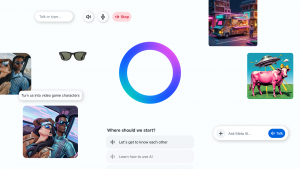Google Buzz and Contact Management Oddities
![]() When Google Buzz launched, I made note of prior gripes I had about it’s contact management:
When Google Buzz launched, I made note of prior gripes I had about it’s contact management:
In Google Reader, one of the least social of all my social media tools, I have a friend named Richard Schwarting, a computer scientist and avid post-sharer. Last night he shared with me the culmination of his frustration with Google and their social initiative in the form of a Get Satisfaction thread:
“Yay for Google Contacts! Now tell us whether to "just wait" on greader issues, or what:getsatisfaction.com/google_contacts doesn’t exist, even though google.com/contacts does. I realize the service is in BETA, but google reader users with issues about relationship mgmt vis-a-vis google contacts are left reading tea leaves.”
There were around 11 people who ‘had the same problem,’ including one who said: “The same is here. It’s very frustrating. I actually nearly gave up on GReader contacts.”
It’s a small and esoteric group of people, we Google Reader fanatics. I get that. It’s indicative of a much larger problem at Google, though. There were a half a dozen points along the way where Google could have certainly quashed the uprising of startups like Twitter and Facebook and never did. They didn’t see the future in them. Only when the social media revolution was well under way did they realize that they held the keys to everyone’s social graph data, and got ‘serious’ about getting something done.
Except nearly nothing ever did get done.
![]() I made the prediction that it’d be about a week before the backlash against the odd contact management Google employs would come to the fore.
I made the prediction that it’d be about a week before the backlash against the odd contact management Google employs would come to the fore.
I was off by about a week. John Herrman over at Valleywag has talked about it, as has Business Insider, though Valleywag puts the problem in it’s most plain English:
A lot of the Giz staff was alarmed by the suggested/automatic follower lists, not because they were automatic, but because it was hard to tell how exactly they were chosen. Obvious additions, like girlfriends or coworkers, seem to make the cut. Other entries were people that were rarely—and sometimes never—emailed from the associated account.
Anyway, point is, it’s an odd concept, made odder by the fact that, as the Silicon Alley Insider noticed, otherpeople can see you’re following, including the auto-adds. To put this in real terms:
• A girl you slept with in college sends you a message on Gchat, to tell you she has five beautiful children now, and that she doesn’t ever think about you, ever. Ok!
• You exchange some messages and a couple emails to be polite. You defuse the situation. You don’t mention it to your current girlfriend, because that would be weird.
• Coincidentally, you enable Google Buzz, which adds both your current girlfriend and this lady who you politely deflected.
• Your girlfriend checks out your Google profile, sees your friends list, and asks you who that lady is.
• You clumsily try to explain, "Oh, it just adds people you talk to automatically," which only makes things worse.
• Fight!
• …
• You break up, which was probably a good thing anyway, because your relationship sounded really unhealthy. But you get the point, right?Since fixing this is as simple as toggling a privacy switch in your profile, it’s less of a disastrous bug than it is an unfortunate default behavior, and despite their early insistence that this is a feature, not a flaw, Google will probably adjust accordingly.
Hopefully, this will be the impetus that forces Google to re-examine their contact management and quickly roll out improvements.
A message from John Furrier, co-founder of SiliconANGLE:
Your vote of support is important to us and it helps us keep the content FREE.
One click below supports our mission to provide free, deep, and relevant content.
Join our community on YouTube
Join the community that includes more than 15,000 #CubeAlumni experts, including Amazon.com CEO Andy Jassy, Dell Technologies founder and CEO Michael Dell, Intel CEO Pat Gelsinger, and many more luminaries and experts.
THANK YOU













